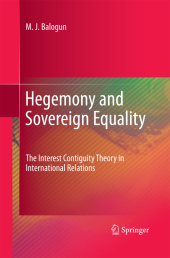 Neuerscheinungen 2014Stand: 2020-02-01 |
Schnellsuche
ISBN/Stichwort/Autor
|
Herderstraße 10
10625 Berlin
Tel.: 030 315 714 16
Fax 030 315 714 14
info@buchspektrum.de |

M. J. Balogun
Hegemony and Sovereign Equality
The Interest Contiguity Theory in International Relations
2011. 2014. xii, 161 S. 235 mm
Verlag/Jahr: SPRINGER, BERLIN; SPRINGER NEW YORK; SPRINGER 2014
ISBN: 1-489-98545-X (148998545X)
Neue ISBN: 978-1-489-98545-3 (9781489985453)
Preis und Lieferzeit: Bitte klicken
The "interest contiguity theory," which is the book´s centerpiece, holds that rather than a smooth, one-way cruise through history, humankind´s journey from the inception to the present has brought him/her face to face with broadly three types of interests. The first is the individual interest, which, strange as it may sound, tends to be internally contradictory. The second is society´s (or "national") interest which, due to the clash of wills, is even more difficult than personal interest to harmonize. The third is the interest espoused to justify the establishment and maintenance of supranational institutions. Though conflicting, some interests are, due to their relative closeness (or contiguity), more easily reconcilable than others.
In tracing the links between and among the three broad types of interests, the book begins with a brief philosophical discussion and then proceeds to examine the implications of human knowledge for individual liberty. Against the backdrop of the epistemological and ontological questions raised in the first chapter, the book examines the contending perspectives on the theory of the state, and in particular, the circumstances under which it is justified to place the interest of society over that of the individual. The focus of the fourth chapter is on the insertion of the supranational governance constant in the sovereignty equation, and on the conflict between idealist and realist, and between both and the Kantian explanations for the new order. The adequacy or otherwise of the conflicting explanations of the change from anarchy to a ´new world order´ is the subject taken up in the succeeding chapters. Besides suggesting a new analytical tool for the study of politics and international relations, the contiguity theory offers statespersons new lenses with which to capture the seismic, perplexing and sometimes disconcerting changes unfolding before their eyes.
The Individual, the State and International Relations: Towards an Interest Contiguity Theory of Parallel and Competing Sovereignties.- The Individual as the Origin and Purpose of Sovereignty.- The State´s claim to obedience.- External effects and the supranational sovereign.- From the League of Foes to the United Nations: A Brief History of Internationalism.- United Nations: Evolution, Structure and Dominant Challenges.- Life, Liberty and the Pursuit of Happiness in a Lawless World.- Towards a genuinely a New World Order.


